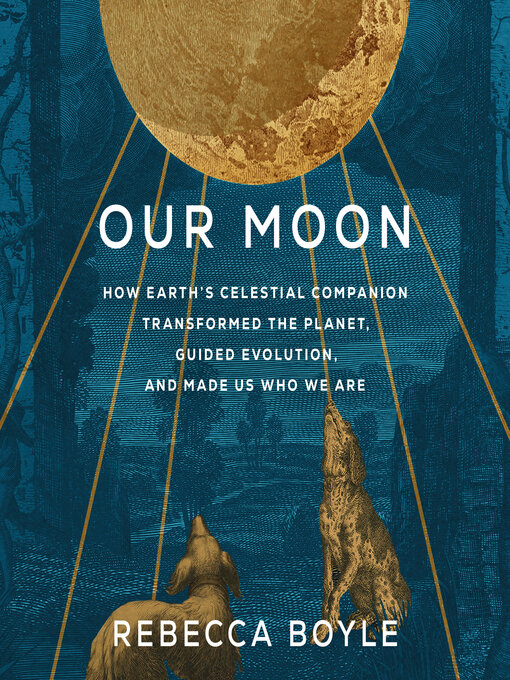Our Moon
How Earth's Celestial Companion Transformed the Planet, Guided Evolution, and Made Us Who We Are
FINALIST FOR THE LOS ANGELES TIMES BOOK PRIZE • A NEW YORKER AND SMITHSONIAN BEST BOOK OF THE YEAR • A New York Times Book Review Editors’ Choice
Many of us know that the Moon pulls on our oceans, driving the tides, but did you know that it smells like gunpowder? Or that it was essential to the development of science and religion? Acclaimed journalist Rebecca Boyle takes readers on a dazzling tour to reveal the intimate role that our 4.51-billion-year-old companion has played in our biological and cultural evolution.
Our Moon’s gravity stabilized Earth’s orbit—and its climate. It drew nutrients to the surface of the primordial ocean, where they fostered the evolution of complex life. The Moon continues to influence animal migration and reproduction, plants’ movements, and, possibly, the flow of the very blood in our veins.
While the Sun helped prehistoric hunters and gatherers mark daily time, early civilizations used the phases of the Moon to count months and years, allowing them to plan farther ahead. Mesopotamian priests recorded the Moon’s position in order to make predictions, and, in the process, created the earliest known empirical, scientific observations. In Our Moon, Boyle introduces us to ancient astronomers and major figures of the scientific revolution, including Johannes Kepler and his influential lunar science fiction.
Our relationship to the Moon changed when Apollo astronauts landed on it in 1969, and it’s about to change again. As governments and billionaires aim to turn a profit from its resources, Rebecca Boyle shows us that the Moon belongs to everybody, and nobody at all.
-
Creators
-
Publisher
-
Release date
January 16, 2024 -
Formats
-
OverDrive Listen audiobook
- ISBN: 9780593790571
- File size: 346203 KB
- Duration: 12:01:15
-
-
Languages
- English
-
Reviews
-
Publisher's Weekly
Starred review from October 2, 2023
Science writer Boyle debuts with an excellent exploration of how the moon has shaped life on Earth. She explains that the moon likely formed from debris loosed after a Mars-size planet collided with Earth in the early days of the solar system, and that the moon’s gravitational pull on Earth stabilizes the planet’s tilt and keeps seasonal change consistent. Noting the moon’s central role in early religion, Boyle argues that a god associated with the moon and worshipped in ancient Mesopotamia “was one of the first gods in human history, if not the very first.” The moon was also central to the development of modern science, Boyle contends, examining how systematic observations of the moon made by early astronomers Thomas Harriot, Johannes Kepler, and Galileo in the late 17th and early 18th centuries established a new approach for studying the natural world. Throughout, Boyle’s dexterous blend of science and cultural history is elevated by her spry prose (“The entire horizon dims to a livid red glow as Earth begins to moan and tremble, shockwaves rattling through its crust and deep into its mantle,” she writes of the cosmic collision that created the moon). This illuminates. -
AudioFile Magazine
Rebecca Lowman's warm, easygoing performance creates a relaxed space for listeners to engage with this expansive cultural and scientific exploration of Earth's and humanity's relationship with the moon across time. The interconnectedness between each section is enhanced as Lowman clearly voices the science behind our world and its living organisms, and the mythos inspired by our natural satellite. Lowman's even pacing moves with ease between the lunar religious observances of ancient Babylon and Scotland, the timekeeping practices of dominant empires, WWII battlefield strategy, and moon landings. Footnotes are interspersed throughout, coming across as personal asides to listeners. This well-rounded production gives plenty of food for thought, inviting us to ponder our own part in Earth's ongoing and essential relationship with our moon. J.R.T. © AudioFile 2024, Portland, Maine
-
Loading
Why is availability limited?
×Availability can change throughout the month based on the library's budget. You can still place a hold on the title, and your hold will be automatically filled as soon as the title is available again.
The Kindle Book format for this title is not supported on:
×Read-along ebook
×The OverDrive Read format of this ebook has professional narration that plays while you read in your browser. Learn more here.


